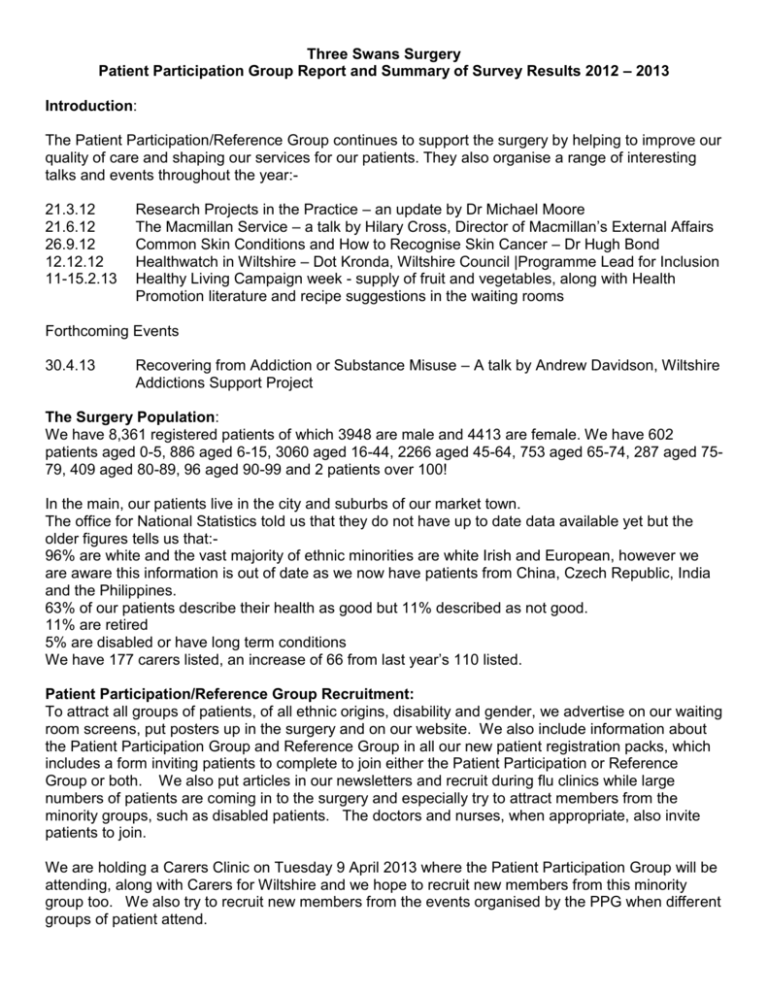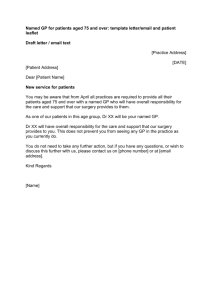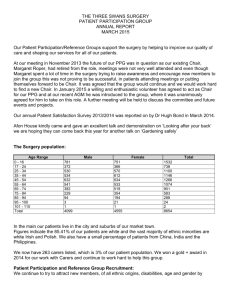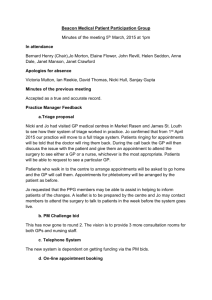Three Swans Surgery Patient Participation Group Report and
advertisement

Three Swans Surgery Patient Participation Group Report and Summary of Survey Results 2012 – 2013 Introduction: The Patient Participation/Reference Group continues to support the surgery by helping to improve our quality of care and shaping our services for our patients. They also organise a range of interesting talks and events throughout the year:21.3.12 21.6.12 26.9.12 12.12.12 11-15.2.13 Research Projects in the Practice – an update by Dr Michael Moore The Macmillan Service – a talk by Hilary Cross, Director of Macmillan’s External Affairs Common Skin Conditions and How to Recognise Skin Cancer – Dr Hugh Bond Healthwatch in Wiltshire – Dot Kronda, Wiltshire Council |Programme Lead for Inclusion Healthy Living Campaign week - supply of fruit and vegetables, along with Health Promotion literature and recipe suggestions in the waiting rooms Forthcoming Events 30.4.13 Recovering from Addiction or Substance Misuse – A talk by Andrew Davidson, Wiltshire Addictions Support Project The Surgery Population: We have 8,361 registered patients of which 3948 are male and 4413 are female. We have 602 patients aged 0-5, 886 aged 6-15, 3060 aged 16-44, 2266 aged 45-64, 753 aged 65-74, 287 aged 7579, 409 aged 80-89, 96 aged 90-99 and 2 patients over 100! In the main, our patients live in the city and suburbs of our market town. The office for National Statistics told us that they do not have up to date data available yet but the older figures tells us that:96% are white and the vast majority of ethnic minorities are white Irish and European, however we are aware this information is out of date as we now have patients from China, Czech Republic, India and the Philippines. 63% of our patients describe their health as good but 11% described as not good. 11% are retired 5% are disabled or have long term conditions We have 177 carers listed, an increase of 66 from last year’s 110 listed. Patient Participation/Reference Group Recruitment: To attract all groups of patients, of all ethnic origins, disability and gender, we advertise on our waiting room screens, put posters up in the surgery and on our website. We also include information about the Patient Participation Group and Reference Group in all our new patient registration packs, which includes a form inviting patients to complete to join either the Patient Participation or Reference Group or both. We also put articles in our newsletters and recruit during flu clinics while large numbers of patients are coming in to the surgery and especially try to attract members from the minority groups, such as disabled patients. The doctors and nurses, when appropriate, also invite patients to join. We are holding a Carers Clinic on Tuesday 9 April 2013 where the Patient Participation Group will be attending, along with Carers for Wiltshire and we hope to recruit new members from this minority group too. We also try to recruit new members from the events organised by the PPG when different groups of patient attend. Profile of the Patient Participation/Reference Group: Over the last year we have managed to increase our Patient Reference group from 170 members to 368, especially from the younger age bracket, and we have also increased our Patient Participation Group from 20 to 34 members, which includes 1 wheel chair bound member, 1 with a learning disability and 2 of other ethnic members. The Reference Group demographics are made up of 161 male and 207 female. We have 55 aged under 16, 9 aged 17-24, 27 aged 25-34 37 aged 35-44, 44 aged 45-54 60 aged 55-64 95 aged 65-74, 33 aged 75-84 and 8 aged 84 and over. This group is made up of 356 White British, 5 White Irish, 1 Black African, 3 Indian and 3 Other ethnic origin. 317 reference group members attend the surgery occasionally, 50 attend often and 1 very rarely. Under Represented Groups: Although we have increased our membership in both groups, we are aware that we need to encourage all areas of the community to join, especially our ethnic minority and disabled patients. We will carry on recruiting by advertising on our website, using our waiting room screens, giving all new patients information, organising events and encouraging patients to join when we have our annual Flu and Carers clinics Patient Survey Priority Areas: In order to identify this year’s priority areas, we organised a PPG group meeting on the 12 December 2012 Chaired by Margaret Roper, Chair of the PPG, and invited patients from both groups by e-mail or by letter. We also advertised this event on our website and in the surgery. This year the PPG wanted to follow up on last year’s survey to find out if patients felt our Telephone Triage service was working well following its introduction last year. Following a patient’s experience of receiving a “satisfactory” cholesterol result, it was decided to check if other patients would like more information, i.e. the actual reading when obtaining their results. Therefore, they wished to include this question. This information would also be useful for finding out patients’ experience of arranging X-rays and obtaining results. As the Receptionists have such an important role in the surgery, the group wished to include a question about the helpfulness of the receptionist. The final questions decided upon were: How helpful were the receptionists Is the Telephone Triage Service working well Blood tests and X-rays – how easy is it to access an appointment Obtaining and Quality of receiving test results Last year’s action plan was reviewed and discussed and all action points had been achieved. Action Plan 2012 AIM To make more patients aware of the Telephone Triage Service ACTION Advertise in the practice leaflet and give prominence on practice website Write an article advertising the service for the next practice RESULT Achieved To advertise further the early morning, later evening and alternate Saturday morning appointments To ensure patients know their options if they need advice or to see a doctor when the surgery is closed Encourage patients to see two doctors in the practice so there is always one they know if their usual doctor is away. newsletter. Action by CC and CG To be completed by end of April 2012 Information already on the website Put up notices in the waiting rooms and receptionists to inform patients opportunistically. Action CG to put up notices within 1 week and brief Reception team at their next planned meeting. This information is on the practice website, on our practice leaflet and on our surgery door but include an article in the next practice newsletter too. Action CC Highlight in the practice leaflet for new patients registering. GPs to encourage the “buddy system” with any patient who they know who usually only sees them. Completed 30/4/12 Achieved Achieved Achieved Achieved Questionnaire: Following the meeting with the PPG, we created our survey questions, (adapted from GPAQ). All members of the Reference group were e-mailed, with the link to our website, asking them to take part, members of the Participation group were sent copies of the questionnaire and paper copies were handed to all patients who came in to the surgery over a three week period from 7 January to 27 January 2013. We received 249 responses. 134/268 virtual group members responded and 115/232 patients responded who visited the surgery. All the responses were collated on the “My surgery website survey facility”. (The paper copies completed by the patients attending the surgery were entered onto the Website survey by a Law Graduate Temp employed for this role). . Respondents: Disappointingly, there were no under 16 who responded, 3% 17-25, 9% 25-34, 12% 35-44, 16% 4554, 12% 55-64, 20% 65-74, 14% 75-84, no response from over 84 and 14% did not leave their age. The responding group was made up of 43% male and 52% female of whom 91% were White British, 1% other and 8% did not leave their ethnicity. Of these 35% come regularly to the surgery, 43% occasionally, 16% very rarely and 6% did not respond to how often they come to the surgery. Meeting to seek the views of the PRG/PPG on the findings of the Patient Survey Results: The results of the survey were published on our website and after discussing a suitable meeting date with Margaret Roper, Chair of the PPG, all members of both the Patient Participation and Reference groups were invited to attend by e-mail or letter. Additionally, information was advertised on the waiting room screens, posters were put up around the surgery and flyers left at reception, inviting all patients to come along to hear Dr Bond present the results. Agreeing and Consulting on the Survey Results and Action Plan: The meeting was held on Thursday 7 March 2013 at 6.45 p.m. at the surgery. This was attended by 7 PPG members, 1 Reference Group Member 1 Partner and 3 members of staff. Dr Bond went through each question and presented the findings below: Summary of the Results: Do you find our Receptionists welcoming and helpful? Last year we introduced our Telephone Triage Service for patients who feel they need to be seen on the day. Have you used this service? If you have used this service how satisfied were you Yes 98% No 1% No response 1% Yes 53% No 44% No response 3% Very satisfied 36% Satisfied 13% No response 48% In the past year if your doctor referred you for a blood test where was it carried out? Surgery 37% Hospital 25% No response 38% How easy was this to arrange? Very easy 43% Easy 16% Not easy 1% No response 40% How easy was it to access the results? Very easy 25% Easy 26% Not very easy 4% No response 45% Were you satisfied with how the results were explained to you? Very satisfied 34% Satisfied 22% Not satisfied 4% No response 40% If your doctor referred you for an x-ray how easy was it to arrange? Very easy 27% Easy 9% Not very easy 0% No response 64% How easy was it to access the results? Very easy 19% Easy 14% Not very easy 2% No response 65% Would you recommend The Three Swans Surgery to your family or friends? Yes 85% No 2% No response 13% Agreeing and Consulting on the Survey Results and Action Plan: The group was pleased with the results of the survey overall. 98% of the survey responders found the receptionists welcoming and helpful and this was upheld by the Group. 97% of patients who responded who had used the Telephone Triage service was either satisfied or very satisfied and the group’s experience of the service was that it seemed to be working really well. One member commented that it was comforting to know if you were unwell you could speak to a doctor, almost straightaway. Dr Bond explained calls could vary in response time depending on the urgency but no patient should wait longer than about half to one hour for a call. He also explained that this service is not a barrier to see a doctor at all, but a more efficient way of dealing with urgent problems and if the duty doctor felt a patient needed to be seen, they would be asked to come down to the urgent clinic, which has appointments specifically for this purpose. Blood taking results were discussed and some felt the hospital had more expertise, but others felt the surgery was as good. Most of the group come to the surgery to have their bloods taken which corresponds with the survey results and all agreed it was not normally a problem to make an appointment and there was not usually a problem to obtain the results. Everyone agreed, as with the survey, that they were satisfied with how the results were explained but that they would like more information when being given, for example, their cholesterol or PSA results. They would prefer this rather than a result of ‘satisfactory’ or ‘within normal range’ and also would like all the doctors to be consistent. The group asked how long and when after a test should patients contact the surgery and where to find this information. Charlotte Gilbert, Practice Manger, told the Group that all consulting rooms have “Phoning for results” slips for clinicians to hand out to patients giving information on how to obtain the results of tests. It is also on our surgery leaflets, website and the information slips are in the waiting rooms. Dr Bond explained how x-ray referrals were sent off and that these results would take a bit longer to come back. Dr Bond read and discussed some additional comments from the survey. The Group were pleased that the feedback was, on the whole, very positive. One comment precipitated Dr Bond explaining the procedure of how referrals are sent to hospitals and how they are chased up, if necessary. A survey suggestion that a ‘European’ category should be added to the ethnicity section of next year’s survey which will be acted on. It was also decided a clearer procedure of how to obtain results was required (see Action Plan below). Resulting Action Plan for 2013 as Agreed at the Survey Meeting AIM ACTION More details and consistency on patient’s results. Doctors to add cholesterol and PSA numbers as standard Dr Bond to inform Partners at the next Partners meeting. Information to be added to locum information pack Reception to be advised figures for Cholesterol and PSA will be added to patients’ results and can be given to the patient. Action by HB and CG by 30.4.13 Clearer instructions on how to obtain results Make sure the Information slips are given to patients, during consultations, by the doctor or nurse as well as verbal information of when and how to obtain results. Make sure notices in waiting room, on the waiting room screens and on our website are clearer for patients Action by CG ‘European’ category added to the ethnicity section of next year’s survey All actions to be reviewed at the next meeting of the Patient Participation Group Action by CG Our practice is open to new patients Our opening hours are:Monday 08.00 a.m. – 7.30 p.m. Tuesday 08.00 a.m. – 6.30 p.m. Wednesday 08.00 a.m. – 6.30 p.m. Thursday 08.00 a.m. – 6.30 p.m. Friday 07.30 a.m. – 6.30 p.m Saturday (alternate) 08.30 a.m. – 11.00am Patients may book appointments with doctors or nurses by ringing the surgery appointment line on 01722 333161 or 01722 333548 or by calling in to the reception desk. We offer face to face appointments and telephone appointments. If you require a same day appointment, you will be put in for a telephone triage call by the duty doctor who will assess your symptoms and help decide what the best course of action is. This may consist of telephone advice, arranging an assessment in our urgent clinic by one of the doctors or nurses, arranging an appointment to be seen at another time or arranging other tests or referrals. We are working towards being able to offer electronic appointments in the near future. Extended Opening Hours – additional appointments available with a doctor Monday 6.30 p.m. – 7.30 p.m. Friday 7.30 a.m. – 8.00 a.m. Alternate Saturdays 8.30 a.m. – 11.00 a.m. All doctors participate in the extended hours rota. Named Doctor Please ask the receptionist if you would like to see a named doctor or nurse.






